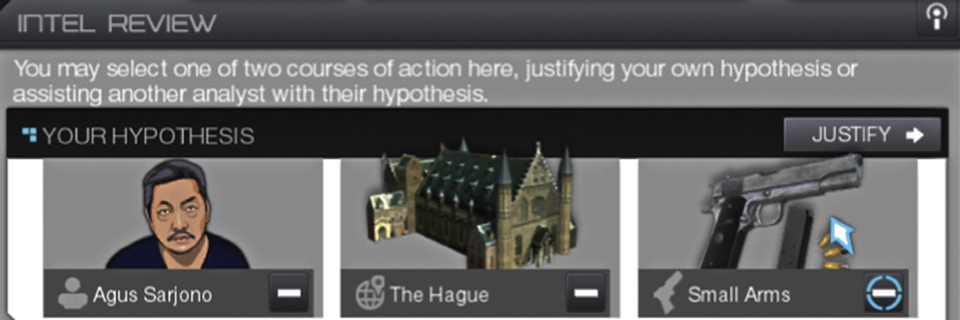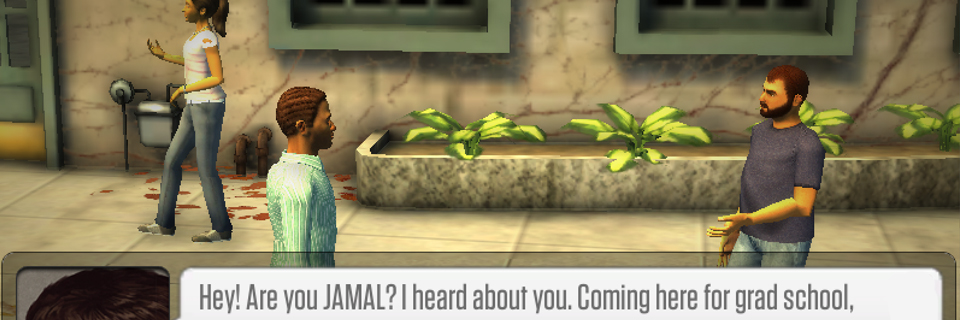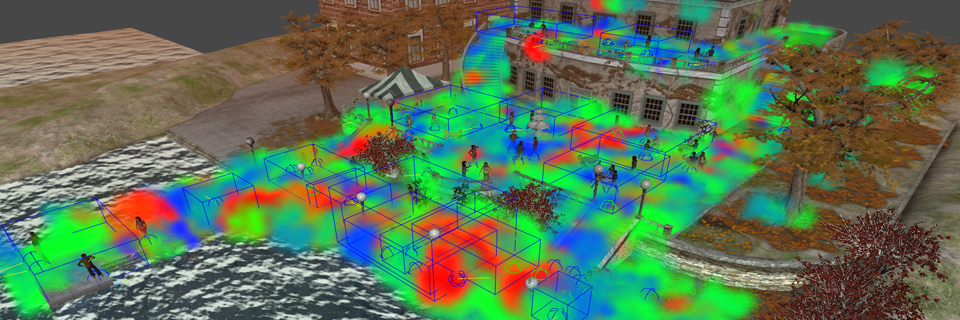Projects
Our team has worked on multiple award-wining educational games and research projects. Let us work on your next project!

Previous projects
Intelligence Crisis: Codename MACBETH

Role: Game design, Prototyping, Research
Game Description: In MACBETH, players, called “analysts,” are presented with a fictional scenario of an impending terrorist attack, and their task is to figure out who the suspect is, where the attack will occur, and what method of attack will be used. MACBETH is a turn-based game, where a human participant plays cooperatively with two non-playable characters (NPCs). In any one turn, analysts are able to gather two pieces of information about the suspect, location, and/or weapon from a combination of intel sources. After gathering information, the human player can generate a hypothesis or aid another analyst (an NPC) if they have information proving or disproving the other analyst’s current hypothesis. Throughout the game, analysts learn about the cognitive biases, and receive implicit and/or explicit feedback (based on condition) encouraging them to delay making a hypothesis, seek disconfirming information that can be used to disprove their hypothesis, and offer alternative hypotheses in their efforts to mitigate confirmation bias.
Papers:
1 2 3 4
Fair Play

Role: Game design, Game Development, Data analysis, Research
Game Description: Fair Play was created as a way to address issues of implicit bias in a safe environment. In Fair Play, the player assumes the role of Jamal, a new graduate student. Along the way, the player is face with bias scenarios, which they must address in order to successfully make it through their first year. It was our hope that, through gameplay, players will be exposed to various anti-bias strategies, which they will incorporate into their daily lives.
Papers:
1
ADAGE

Role: Design, Development, Data analysis, Research
Description: ADAGE is a system that allows users to collect in-game data. An important feature of the ADAGE API is its flexibility to collect data from any player interaction we wish to study. This includes simple things like mouse clicks, and more complex things like changes to the game’s internal state.
Papers:
Owen, V. E., Ramirez, D., Salmon, A., & Halverson, R. (2014). Capturing Learner Trajectories in Educational Games through ADAGE ( Assessment Data Aggregator for Game Environments ): A Click-Stream Data Framework for Assessment of Learning in Play. American Educational Research Association Annual Meeting, 1–7.
About
A growing body of research suggests that digital media, such as games, can provide powerful mechanisms for learning. We at Videogame Researcher believe in the great potential of videogames as immersive teaching tools and as a disruptive artistic medium. Videogame Researcher LLC offers several services related to the field of videogames, education, and research. Let our team help you with your education and videogame needs!
Services
Game Development

Whether it's game design, project management, prototyping, or programming our team can help. Contact us!
Data Analysis and Visualization

Let us help you to tell a story with your data! Let's analyze some data!
Workshops and Tutoring

Our team has lead several successful workshops where we help anyone make or improve their games. From one day workshops around
Need one on one help? We also offer remote private tutoring. Get feedback on your game or learn to code the game you're always wanted. Start making games today!
Publications

The following are papers and presentations based on our games, research, and analysis.
Journal Articles
- Gutierrez, B., Kaatz, A., Chu, S., Ramirez, D., Samson-Samuel, C., & Carnes, M. (2014). FairPlay: A Video Game Designed to Address Implicit Race Bias through Active Perspective Taking. Games for Health Journal.
- Dunbar, N. E., Wilson, S., Adame, B., Elizondo, J., Jensen, M. L., Miller, C., . . . Ramirez, D. Squire, K. (2013). MACBETH: Development of a Serious Game for the Mitigation of Cognitive Bias. International Journal of Game Based Learning.
Conference Proceedings
- Ramirez, D., Berland, M. (2015) Using Spatial Game Analytics to Analyze Player Paths Through Games. Proceedings of the Games Learning Society (GLS) Conference. Madison, Wisconsin.
- Tissenbaum, M., Ramirez, D., Stenerson, M., Goodin, I., Berland, M. (2015) ADAGE (Assessment Data Aggregator for Game Environments). Proceedings of the Games Learning Society (GLS) Conference. Madison, Wisconsin.
- Ramirez, D., Seyler, S., Squire, K., & Berland, M. (2014). I’m a Loser, Baby : Gamer Identity & Failure. In Proceedings of DiGRA 2014: the of Game . Snowbird, Utah.
- Ramirez, D., Saucerman, J., & Dietmeier, J. (2014). Twitch Plays Pokemon : A Case Study in Big G Games. In Proceedings of DiGRA 2014: the of Game .
- Litts, B., Ramirez, D. (2014) Making people fail: Failing to learn through games and making. Proceedings of the Games Learning Society (GLS) Conference. Madison, Wisconsin.
- Squire, K., Halverson, R., Kasemodel, K., Shapiro, B., Gaydos, M., Owen, E., Beall, M. Ramirez, D. (2013) CyberSTEM: Making Discovery Visible Through Digital Games. The Computer Supported Collaborative Learning (CSCL) Conference 2013
- Gaydos, M., Squire, K., Ramirez, D., Martinez, R., Samson-Samuel, C. (2013)Educational Game Design - Prototyping with Purpose. The Computer Supported Collaborative Learning (CSCL) Conference 2013
- Owen V. E., Ramirez D., Salmon A. & Halverson R. (2013) Capturing Learner Trajectories in Educational Games through ADAGE (Assessment Data Aggregator for Game Environments): A Click-Stream Data Framework for Assessment of Learning in Play. Proceedings of the Games Learning Society (GLS) Conference. Madison, Wisconsin.
- Ramirez, D. (2012). Epic Fail:Why is it ok to fail in Videogames? In C. Martin, A. Ochsner, & K. Squire (Eds.), Proceedings of the 8th Annual Games+Learning+Society (GLS) Conference. Pittsburgh, PA: ETC Press.
- Ramirez, D., Chu, S., Samson-Samuel, C., Gutierrez, B., & Carnes, M. (2012). Pathfinder: Developing prototypes towards an engaging game to reduce implicit bias. In C. Martin, A. Ochsner, & K. Squire (Eds.), Proceedings of the 8th Annual Games+Learning+Society (GLS) Conference (pp. 431-437). Pittsburgh, PA: ETC Press.
- Gutierrez, B., Chu, S., Paiz-Ramirez, D., & Squire, K. (2011) Pathfinder: A case example of designing an engaging game on unconscious bias. In Proceedings of the 5th Digital Games Research Association (DiGRA) Conference, Think Design Play. Utrecht, Netherlands.
Book Chapters
- Ramirez, D. Squire K., (2015) Gamification and Learning. In S. P. Walz & S. Deterding (Eds.), The Gameful World (p. 688). Cambridge MA: The MIT Press. Retrieved from http://mitpress.mit.edu/books/gameful-world
Other Writing
- Ramirez, D. (2014) App Awe: Failure by Design. Wisconsin Institute for Discovery, Retrieved from http://wid.wisc.edu/wid-series/app-awe/app-awe-failure-by-design/
- Ramirez, D. (2014) The Infinite Player Theorem. Gamasutra, Retrieved from http://gamasutra.com/blogs/DennisRamirez/20140225/211555/The_Infinite_Player_theorem.php
- Squire, K., Ramirez, D. (2012) Video Games and Learning. Amplify, Retrieved from http://amplify.com/article/video-games-and-learning
- Paiz-Ramirez, D., Chu, S., Salmon, A., & Gutierrez, B. Designing games for non-gamers: Adopting rapid prototyping as a design methodology. User Experience, 10(4).
Presentations
- Fay, I., Schell, J., Hunicke, R., Zhu, J., Ramirez, D. (2017) Teaching Virtual Reality Game Development. Game Developer’s Conference (GDC). San Fransisco, California. (In second round of review)
- Ramirez, D., Berland, M. (2015) Using Spatial Game Analytics to Analyze Player Paths Through Games. Proceedings of the Games Learning Society (GLS) Conference. Madison, Wisconsin.
- Beaber, R., Higgen, T., DeVane, B., Ramirez, D., Norton, D., Gilbert, Z. (2015) Games, Race, and Education: A Field-wide Discussion with Educators, Academics, and Industry. Games Learning Society (GLS) Conference. Madison, Wisconsin.
- Ramirez, D., Seyler, S., Squire, K., & Berland, M. (2014). I’m a Loser, Baby : Gamer Identity & Failure. In DiGRA 2014: the of Game . Snowbird, Utah.
- Ramirez, D., Saucerman, J., & Dietmeier, J. (2014). Twitch Plays Pokemon : A Case Study in Big G Games. In DiGRA 2014: the of Game .
- Litts, B., Ramirez, D. (2014) Making people fail: Failing to learn through games and making. Proceedings of the Games Learning Society (GLS) Conference. Madison, Wisconsin.
- Owen, V.E., Ramirez, D., Salmon, A. & Halverson, R. (2014, April). Capturing Learner Trajectories in Educational Games through ADAGE (Assessment Data Aggregator for Game Environments): A Click-Stream Data Framework for Assessment of Learning in Play. Presented at the 2014 American Educational Research Association Annual Meeting, Philadelphia, PA
- Chen, M.; Salter, A.; Ramirez, D.; Peterson, M.; Salter, A.; LaLone, N.; Danilovic, S. (2014)“Gameception: The Game A Week Challenge.”North American Simulation and Gaming Association, Baltimore, MD, October 8-12.
- Owen, E., Ramirez, D. (2013). Capturing Learner Trajectories in Educational Games through ADAGE (Assessment Data Aggregator for Game Environments): A Click-Stream Data Framework for Assessment of Learning in Play. Games Learning Society (GLS) Conference, Madison, WI, June.
- Ramirez, D. Let’s Make A Game (2013). Presented at the annual Games+Learning+Society (GLS) Conference, Madison, WI, June.
- Ramirez, D., Hatfield, D., Samson-Samuel, C., & Owen, L. (2012). Meaningful failure. Roundtable presentation at the Meaningful Play 2012 Conference, East Lansing, MI, October 18-20.
- Chu, S., Ramirez, D., & Samson-Samuel, C. (2012). Iterating towards balance: Converging educational content and core gameplay in a game for social impact. Invited poster presented at the Wisconsin Center for Education Research Poster Fair, Madison, WI, November 28.
- Chu, S., Gutierrez, B., Ramirez, D., Samson-Samuel, C., Squire, K., & Carnes, M. (2012). Content in context: Abstraction vs. realism in designing games for social impact. Roundtable presentation at the Meaningful Play 2012 Conference, East Lansing, MI, October 18-20
- Ramirez, D. Epic Fail: Why is it ok to fail in videogames? (2011). Presented at the annual Games+Learning+Society (GLS) Conference, Madison, WI, June.
- Gutierrez, B., Chu, S., Paiz-Ramirez, D., & Squire, K. (2011). Pathfinder: A case example of designing an engaging game on unconscious bias. Practice report to be presented at the 5th Digital Games Research Association (DiGRA) Conference, Utrecht, The Netherlands, September 14-17.
- Robinson, E., Salmon, A., Paiz-Ramirez, D., Chu, S., Gutierrez, B., Squire, K., Millar, S., & Carnes, M. (2011). Iterative prototyping in the design of a game to promote diversity in STEMM fields. Invited workshop presented at the annual Games+Learning+Society (GLS) Conference, Madison, WI, June 15-17.
Invited Talks
- Epic Fail. (2016) University of Southern California
- Epic Fail. (2016) TEDxABQ. Albuquerque, NM. http://bit.ly/1PN7Kks
- Game Jam Keynote. (2015) University of Southern California. Los Angeles, CA.
- Super Power Point. (2014) UW-Madison. Madison, WI.
- The Good, the Bad, and the Ugly. (2013) UNM. Albuquerque, NM.
- The Good, the Bad, and the Ugly. (2013) LEGO. Billund, Denmark.
Contact
Thank you for contacting us.
A representative should be with you shortly!
Something went wrong.
Something went wrong, go back and try again!
Something went wrong.
You answered the anti-spam question incorrectly!







